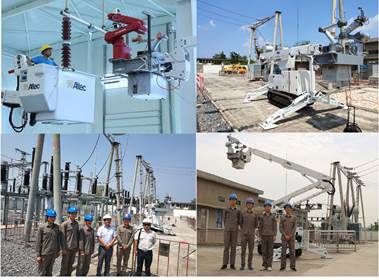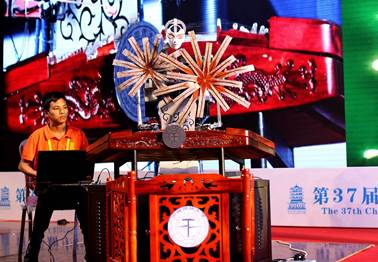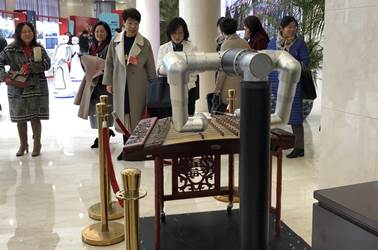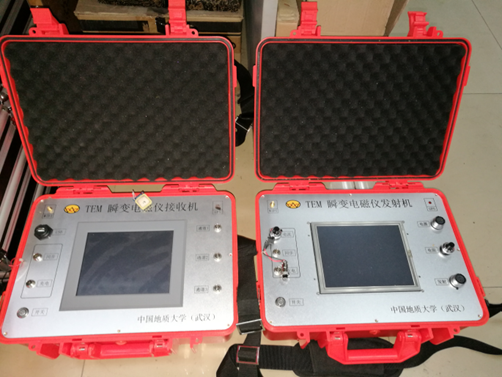Facing the cutting-edge research direction of robots and intelligent systems, the team carries out researches on multi-agent system self-learning, robot intelligent control technology in strong electromagnetic environment, multi-source perception music robot humanoid control technology, and coordination control of drilling process. 1.Multi-robot self-learning decision making and coordination control integration based on virtual individual behavior approximation To tackle the complex conditions in flexible task, such as uncertain environment, variable load, and unpredictable disturbance, the project mainly investigates the integration of dynamic decision-making and coordination control among multiple robots. It has important theoretical significance and application prospect for providing a new solution to design intelligent decision-making and control system for multi-robot systems, which are applied for the flexible tasks of intelligent manufacturing. 2. Research on the technology of automatic mechanical arm of power substation maintenance, 110kV transformer short-circuit resistance check Facing the typical live working scene of substation equipment, the first domestic automatic maintenance platform for equipotential operation of artificial intelligence is designed, which overcomes the problems of outdoor strong light interference and strong electromagnetic shielding. In the absence of any explicit identification, the operation accuracy can reach ± 4mm in the field environment, which can realize the work such as bolt locking and unlocking of drainage line hardware, replacement of hardware panel and insulator cleaning in 110kV and below substations, with high practical value. 
Figure.1 Working demonstration of automatic maintenance platform and group photo. 3. Research on the key technology of intelligent Dulcimer Playing Robot to read and play music This project develops originally new innovative techniques for intelligent composition and synergetic performance using music robots, based on affective computing. It will also bring new ideas for developing music robots for intelligent music score recognition, intelligent composition, anthropomorphic design, and human-computer cooperative performance, with important scientific significance in promoting the development of service robots' intelligence under multiple perceptions. 
Figure.2 The first generation of music playing robot performing on the 37th China control conference closing ceremony 
Figure.3 The second generation of music playing robot performing on service robot exhibition of Changshu two sessions 4. Multi-crane collaborative hoisting planning and control technology in unknown complex operation environment Aiming at the problem of safe and efficient autonomous operation planning and control for multiple cranes in complex operation environment, studying the unknown complex operation environment identification and space reconstruction technology, multi-crane manipulator dynamics and kinematics modeling technology, multi-machine load dynamic coordination and distribution technology, multi-objective collaborative optimization technology, and multi-crane under-drive control method. Developing 3D intelligent expert hoisting guidance system and carry out industrial application. 5. Research on the key techniques of state detection, modeling, and control of complex metallurgical processes based on multiple time and space scales Considering the multidimensional features of time and space for the typical process of metallurgy industry, studying the decomposition and reconstruction method based on the multi-scale characteristics of time and space scale, the soft measurement technique of the states that is difficult to check in the airtight metallurgical device, the hybrid modeling method based on mechanism and data, and the control theory and technology based on multi-time scales. Designing and develop the application system for the practical industrial. 6. Advanced electromagnetic detection theory and transient electromagnetic detection system. Transient electromagnetic detection technology is widely used in urban infrastructure, damages about road, and subsurface target detecting. We develop portable transient electromagnetic detecting equipment, which is able to achieve subsurface detection with intelligent inversion methods. So far the prototype developed has been tested in practice. In addition, we also developed the high-power transient electromagnetic detection system. 
Figure 4. The prototype of transient electromagnetic detection. |
The team has published 156 papers in related fields, of which 34 were indexed by SCI and 117 by EI. 55 invention patents have been applied, 16 of which have been authorized. 2 scientific and technological achievement appraisal of Hunan province have been completed and 1 industrial standard have been set. Publications: [1] Chen X, Wang W, Cao W., Wu M. Gaussian-kernel-based adaptive critic design using two-phase value iteration [J]. Information Sciences, 2019, 482: 139-155. [2] Chen X, Hu J, Wu M, et al. T–S Fuzzy Logic Based Modeling and Robust Control for Burning-Through Point in Sintering Process [J]. IEEE Transactions on Industrial Electronics, 2017, 64(12): 9378-9388. [3] Chen X, Chen X., Wu M, et al. Modeling and optimization method featuring multiple operating modes for improving carbon efficiency of iron ore sintering process[J]. Control Engineering Practice, 2016, 54: 117-128. [4] Chen X, Xie P, He Y, et al. Coordinated learning based on time-sharing tracking framework and Gaussian regression for continuous multi-agent systems[J]. Engineering Applications of Artificial Intelligence, 2015, 41: 56-64. [5] Chen X, Li Y. A modified PSO structure resulting in high exploration ability with convergence guaranteed[J]. IEEE Transactions on Systems, Man, and Cybernetics, Part B (Cybernetics), 2007, 37(5): 1271-1289. [6] Zhou K., Chen X., Wu M., Cao W., Hu J. A new hybrid modeling and optimization algorithm for improving carbon efficiency based on different time scales in sintering process [J]. Control Engineering Practice, 2019, DOI:10.1016/j.coneng prac.2019.10 4104. [7] An J., Shen X., Wu M.*, Jinhua She. A multi-time-scale fusion prediction model for the gas utilization rate in a blast furnace [J]. Control Engineering Practice, 2019. DOI: 10.1016/j.conengprac.2019.104120. [8] An J., Yang J., Wu M.*, Jinhua She, Takao Terano. Decoupling control method with fuzzy theory for top pressure of blast furnace [J]. IEEE Transactions on Control Systems Technology. 2019, 27 (6): 2735-2742. [9] An J., Zhang J., Wu M.*, Weihua Cao, Takao Terano. Soft-sensing method for slag-crust state of blast furnace based on two-dimensional decision fusion [J]. Neurocomputing. 2018, 315:405-411. [10] Huang Y., An J.*, He Y., Wu M.. Quasi-convex combination method and its application to the stability analysis of 2-D discrete-time Roesser systems with time-varying delays [J]. IET Control Theory & Applications, 2018,12(6):718-727. [11] Wu M., Cao W., Chen X.. Intelligent control of complex metallurgical processes [M]. Beijing: Science Press, 2016. [12] Wang G., Ji L., Li D., PSOC4 technologies and applications[M], Beijing: Tsinghua University Press, 2014 Research Awards: 1. The First Prize of the 2nd Hubei Province Self-made Experiment Instruments for College Education, 2018. 2. The Second Prize of the 3rd National Self-made Experiment Instruments for College Education, 2014. |
